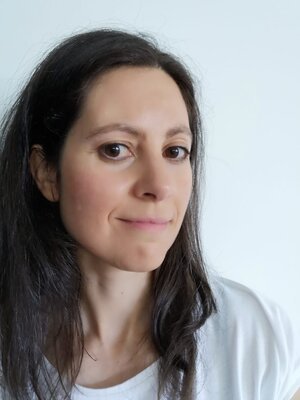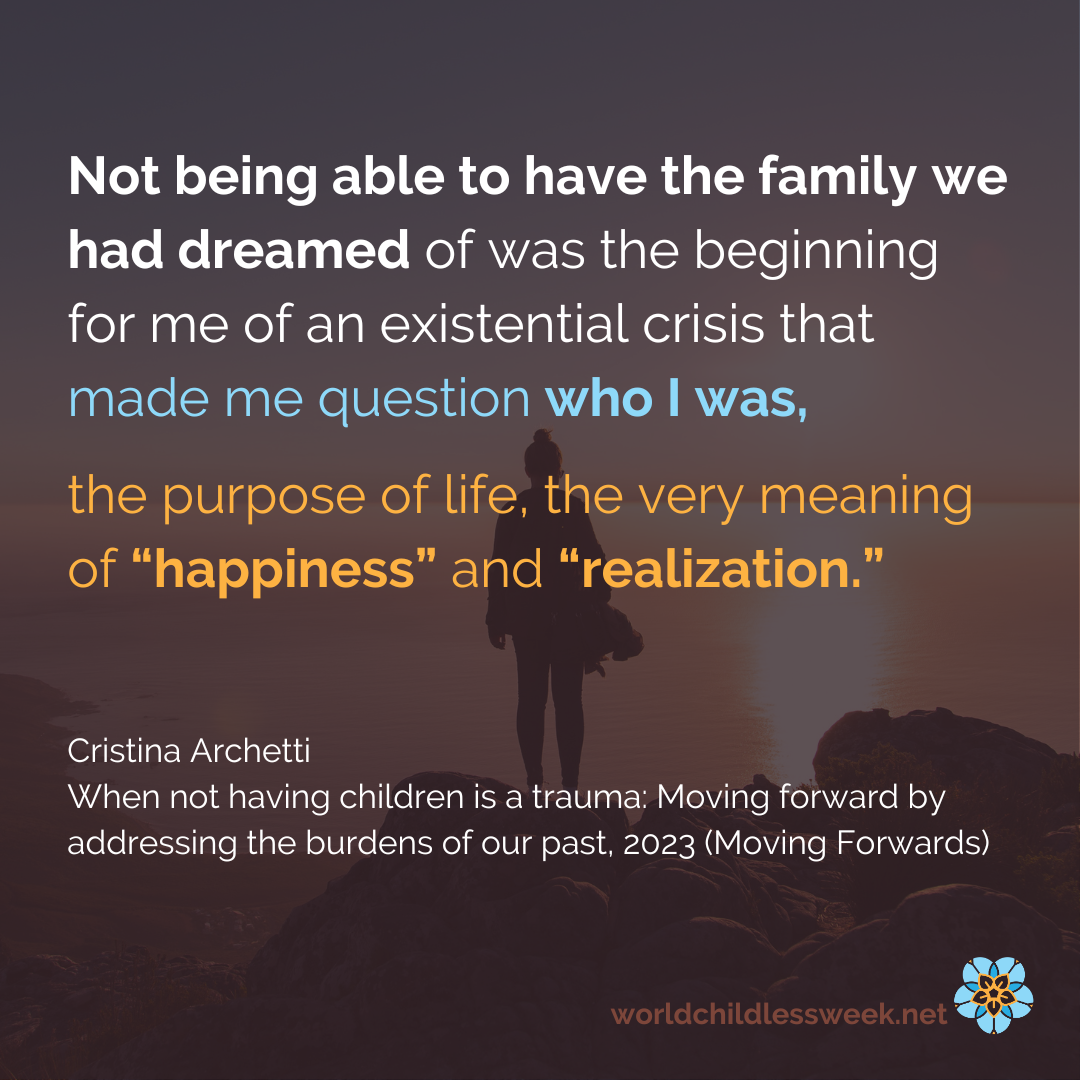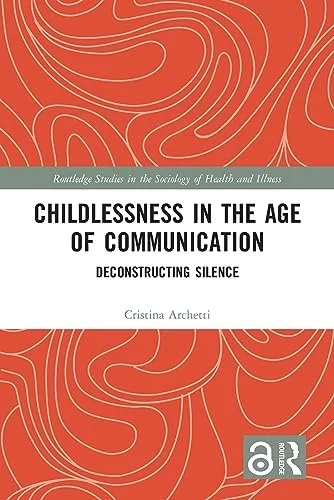Cristina Archetti
Most of those who have never lived through infertility do not realize that not being able to conceive is not “just” about not having a baby—as utterly heartbreaking as that is. It is a cataclysm in one’s entire life. What I discovered through my practice as psychotherapist is that not having children can also be a trauma and—worse—that this is often “nested” on previous scars from our past. In this short piece I explain why unburdening ourselves of this past luggage is key to processing the grief in our present and, ultimately, to moving forward.
The journey that brought me here
I am a researcher, teacher and mentor. I thought I had a fairly happy and successful life until I was diagnosed with “unexplained infertility.” Although my husband and I embarked on assisted reproduction, we ended our medical journey without a child. Not being able to have the family we had dreamed of was the beginning for me of an existential crisis that made me question who I was, the purpose of life, the very meaning of “happiness” and “realization.” I wrote about what involuntary childlessness means and feels like, and how it affects every fiber of one’s being in Childlessness in the Age of Communication: Deconstructing Silence.
Although working on that book had somehow a soothing effect on my grief, I still felt I was carrying, deep inside myself, an unhealed injury. That is what drove an initial fascination with “trauma”—whose Greek root, not by chance, means “wound”—and later led me to train as psychotherapist specialized in trauma.
Undergoing therapy myself as part of my course helped me uncover and face past traumas I had thus far been unaware of. The most amazing discovery for me was that, in parallel with the progressive healing of those past traumas, many of the triggers I used to experience—like finding the sound of children at play painful and intolerable, for example—started to fade. As I remember, at some point I realized I had just walked next to a playground—without heartache and without having had to think about elaborate detours. How was that possible?
This experience made me realize that my grief for not having children was in fact connected to open wounds from my past and that healing those was also key to healing my present.
I am now working on a new book on the importance of understanding infertility as trauma.
Trauma and involuntary childlessness
But what is trauma? We tend to associate the term “trauma” to extreme situations, like war, natural disasters, or to being victims of violence. Trauma, however, is a much more “ordinary” experience than we might think: it is indeed anything that we might find overwhelming, that psychologically or physically is too intense, or that happens too fast for us to process. It might be something that happened to us: an accident, a loss. It can also be something that did not happen.For instance, a parent who was not able to take care of our basic needs when we were very small. Or, as in the case at hand, something we desperately wanted and that, despite all our efforts, we never managed to achieve.
If we are not able to respond to the overwhelming circumstances we are in by removing ourselves from the situation— flight —or directly addressing the cause of the threat— fight —in order to be able to survive we either freeze or submit (fawn). A part of our psyche, in practice, splits off and gets “buried” into our unconscious, where it will continue to live without us either realizing it is there and/or being able to reach it. What we have perceived as unbearable, in other words, is hidden away, into the depths of our mind and our body.
To keep the emotions and memories of this unbearable experience away from consciousness takes a huge amount of our energy. As a result, we might feel tired all the time, find it difficult to concentrate, to be creative and to see solutions. We might feel confused and unable to be fully ourselves—very much like being a PC with a programme constantly running in the background and draining our resources. We might end up living in a “state of emergency,” where we are constantly on guard and cannot find rest or peace, neither within ourselves, nor with others. The tension we store in the body might further turn into physical pain or, worse, over time, into chronic illness.
My own experience made me realize the devastating extent to which hidden trauma from our past limits and distorts our present, robbing us of joy and energy. This happens, as in my case, even if we think nothing remarkable (or “traumatic”) has occurred in our life—that is, in fact, an illusion our unconscious has fabricated for us to be able to survive.
When grief is “complicated”: Infertility as trauma
If one has been planning for an entire life to have a child and this desire does not materialize, experiencing shock, grief and a deep sense of loss is an entirely natural and appropriate reaction. Although many do not understand how and why we can grieve somebody who perhaps was never born or lived only briefly, our feelings are valid. Our children have existed—and always will—in our hearts, minds and bodies.
Grief is the way we, as humans, process a devastating loss. As such, it has no deadline: we all experience grief differently and take our own time to cope with it. Yet, if grief continues indefinitely, if we feel unable to draw a line under it, and letting go of the dream of having a child seems impossible, that might be because our longing has become entangled with additional burdens from our past.
Addressing the traumas of the past: Unburdening our present
As I further observed in a study in which I provided psychotherapy sessions to six involuntary childless women, the uncertainty and powerlessness of going through assisted reproduction (IVF), waiting for adoption, or trying to conceive without success, in cyclical waves of hope and despair, often for many years, can be traumatizing experiences in themselves. The trauma of infertility is also often complicated by its “nesting” onto previous traumas we might already have (as in my case, without knowing it) from our childhood or even from previous generations. It is by addressing such traumas of the past in therapy that we can free ourselves from the burdens that keep us stuck, making it possible to genuinely move forward.
A better understanding of infertility as trauma among health practitioners and policy makers would also ensure that the long-term suffering of many childless people—which remains currently unacknowledged and unhealed—is taken seriously, treated appropriately and, above all, met with the respect and the care it deserves.
Photo by Arthur Brognoli on Pexels
Childlessness In The Age Of Communication: Deconstructing Silence - Cristina Archetti
Cristina Archetti started researching childlessness after being diagnosed with "unexplained infertility". She soon discovered that, although involuntary childlessness affects an increasing number of women and men across the world, this topic is shrouded taboo and shame. This book is both a first-person reflection about the existential questions posed by involuntary childlessness and a readable account of the way the silence surrounding this topic is socially and politically constructed. ISBN-13: 978-1032478067



